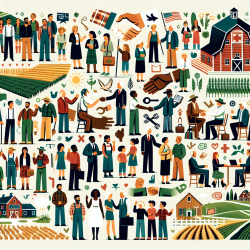In the ever-evolving landscape of American politics, understanding the dynamics of rural populism is crucial for practitioners working in these communities. The research article "Was it rural populism? Returning to the country, 'catching up,' and trying to understand the Trump vote" by Adam Jadhav offers valuable insights into the factors that contributed to the political shifts in rural America. This blog post aims to help practitioners improve their skills by exploring the outcomes of this research and encouraging further investigation.
The Context of Rural Populism
The study by Jadhav delves into the socio-economic and cultural factors that have shaped the political landscape in rural areas, particularly in the Midwest. The research highlights how historical events, economic downturns, and demographic changes have contributed to a sense of disenfranchisement among rural populations. This has often been manifested in support for populist leaders who promise to address these grievances.
Key Insights for Practitioners
Understanding these dynamics is essential for practitioners who work with rural communities. Here are some key insights from the research:
- Economic Disparities: The decline of manufacturing jobs and the agricultural crisis have left many rural areas economically vulnerable. Practitioners should be aware of these economic challenges and advocate for policies that support sustainable development and job creation.
- Cultural Identity: The research emphasizes the importance of cultural identity in shaping political views. Practitioners should engage with community members to understand their values and traditions, which can inform more effective communication and intervention strategies.
- Political Engagement: Many rural residents feel disconnected from mainstream political discourse. Practitioners can play a role in facilitating dialogue between communities and policymakers to ensure that rural voices are heard.
Encouraging Further Research
The findings from Jadhav's study underscore the need for ongoing research into rural populism and its implications. Practitioners are encouraged to explore further studies that examine the intersection of race, class, and geography in shaping political attitudes. By deepening their understanding of these issues, practitioners can develop more nuanced approaches to working with rural populations.
Practical Applications
Practitioners can apply these insights in several ways:
- Community Engagement: Foster open dialogues within communities to discuss local concerns and aspirations. This can help build trust and collaboration between residents and external stakeholders.
- Policy Advocacy: Advocate for policies that address economic disparities and promote social cohesion. This includes supporting initiatives that enhance education, healthcare access, and infrastructure development in rural areas.
- Cultural Competency: Develop cultural competency by learning about local histories and traditions. This knowledge can enhance practitioners' ability to connect with community members on a personal level.
The Path Forward
The journey towards understanding rural populism is ongoing. As practitioners continue to engage with these communities, it is essential to remain open-minded and adaptable. By leveraging research insights and fostering meaningful connections, practitioners can contribute positively to the social fabric of rural America.
To read the original research paper, please follow this link: Was it rural populism? Returning to the country, “catching up,” and trying to understand the trump vote.










